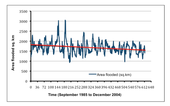Highlight
Elephants and Water
Achievement/Results
Besides the obvious connection that elephants need water, and lots of it; water and elephants share something else in common. They are both serious management issues in southern Africa and each is driving the other to make things worse.
An interdisciplinary team of NSF-IGERT students and faculty from the University of Florida’s IGERT in Adaptive Management are working with local and national government agencies to help solve two of Africa’s most serious natural resource management problems – too many elephants and too little water. The team funded by a National Science Foundation grant under the Integrative Graduate Education Research Traineeship Program is lead by Mark T. Brown, Professor of Environmental Engineering Sciences at UF and PI on the IGERT project. The team of students and faculty represent a diverse array of Departments including: Engineering, Geography, Soil and Water Science, Natural Resources, and Forest Resources and Conservation which has brought into sharp focus the multifaceted issues that were explored.
In partnership with scientists from the University of Botswana?s Okavango Research Institute, the IGERT team is using state of the art simulation models linked with satellite monitoring to predict impacts of global climate change on the ecology and economy of southern Africa and measuring the impacts of ongoing development activities that are aimed at addressing water and wildlife related issues. Most of southern Africa is highly vulnerable to climate change as it is situated in one of the most highly variable climatic regions on the planet. Water resources are already under pressure in southern Africa, and climate change will lead to a decline in the availability of surface water resources. This is happening at the same time as population growth and socio-economic development are increasing the demand for water.
Southern Africa’s elephant population is expanding at a rate that many scientists consider destructive to the ecology not to mention impacts on human welfare. Elephants do not have natural predators other than humans and since elephant hunting has been outlawed in Africa, populations are increasing. Human and elephant populations are growing at rates of about 3% and 5% per year, respectively, As human populations expand, the result is conversion of more and more marginal land into agricultural production, further reducing elephant range, increasing their density and increasing human elephant conflicts.
The researchers have found that both issues are coupled in a most important way. Together, human expansion into marginal lands and increasing numbers of elephants, are leading to large-scale deforestation of woodlands which in turn is changing regional hydrology and potentially rainfall in the long run. Elephants too impact woodlands, as they are browsers of both grasses, shrubs and trees. The are known to deforest woodlands to increase growth of shrubs and grasses. The conversion of woodlands by both humans and elephants impacts water balances through changes in transpiration, discharge timing and stream flow characteristics. The net result of which is less water availability exacerbating the effects of climate change, which have increased the annual fluctuations in wet and dry seasons.
Using simulation models and analysis of satellite imagery from the past 20 years, researchers have shown significant declines in total rainfall and a three fold increase in the number of drought years over the past 25 years as compared to the previous twenty-five. Ecological models of the Okavango Delta predict significant shifts in the extent of floodplains that are critical wildlife foraging areas and fish breeding areas, which will translate into declines in these populations. Results from the modeling efforts are being used to shape management of the Okavango and Chobe watersheds and to provide needed scientific input to OKACOM,the transboundry governmental organization charged with developing an overall policy framework for management of the Okavango River.
As human populations increase, elephants are increasingly confined to smaller areas and their numbers are exceeding local carrying capacities. As their numbers increase and the extent of flooding by the rivers of northern Botswana decline, the team?s simulation models show that elephant impacts on both ecological systems and human economies will continue to grow in seriousness, with increased conflicts between human populations and elephants over water and space. There are few alternatives available to wildlife managers to control elephant populations as their number has increased to the point that even culling presents unimaginable logistical complexities because of the size and shear number of elephants.
Combined, the effects of climate change on rainfall patterns producing longer and more frequent dry periods, the increased numbers of elephants, and the decreased habitat area may be forcing the northern Botswana region toward a tipping point shifting the region into a far dryer inhospitable landscape. The team?s simulation models when allowed to run far enough into the future suggest that this scenario is not without merit. The results of their simulation models are striking, showing a disproportionate sensitivity to changes in flow patterns of rivers with declining extent of wetlands under most simulated development and climate change scenarios.
UF-IGERT trainees include: Anna Cathey, Andrea Gaughan, Bill Kanapaux, Gregory Parent, Narcisa Pricope, and Deborah Wojcik,. UF-IGERT faculty involved: Dr. Mark Brown, (PI), Dr. Sandra Russo (Co-PI), Richard Hamann, Esq. (Co-PI), Dr. Rafael Munoz-Carpena, and Dr. Gregory Kiker. University of Botswana Faculty: Dr..Mike Murray-Hudson, Dr Piotr Wolski, and Dr.Olekae Thakadu
Address Goals
Learning: We believe that a significant part of our southern Africa research program has been to developed an environment that fosters inclusiveness and cultural sensitivity. While working abroad on this project, trainees are required to develop presentations and reports of findings to local government and citizen groups as well as groups of students and faculty at our cooperative institutions abroad. Responsible research conduct is emphasized through our philosophy that data collected, insights developed, and management implications identified must be shared. In this way we provide a venue to foster better understanding, true communication, and deeper appreciation for local culture and build responsible and ethical approaches to research.
Participating in this applied, field oriented research are 2-3 of our IGERT faculty each year who develop a strong working relationship amongst themselves and with the IGERT students. The experience not only develops a strong bond within the team, but provides an experiential backdrop spanning concerns in social, ethical, and scientific domains. In addition, the students are immersed in a cultural setting that provides a rich environment for cross-cultural learning. Our students make presentations to and work with faculty and students form our cooperative institutions in Botswana.
Since our southern Africa research program is in a relatively undeveloped area, our students are involved in community projects and education initiatives related to program objectives on a volunteer basis and work closely with students from the University of Botswana and KwaZulu Natal during their research activities.
Discovery: Our IGERT program stresses Adaptive Management (AM) as its theme and central focus. AM refers to the process of continually improving management policies and practices by learning from the outcomes of operational programs. This approach to managing natural resources requires a high degree of cooperation among engineers, biophysical and social scientists to translate management objectives into a research framework that can be used to guide implementation. Our southern Africa research program approaches watershed management from biotic, physical, economic, geologic, legal, political, sociological, and human health perspectives, using adaptive management explicitly as both a focus for critique, and as an evaluative tool. We stress multidisciplinary synthesis of information, development of research agendas, questions of scale in data acquisition and evaluation, uncertainty, and above all the management implications of the research. Throughout this research program we have placed a strong emphasis on multidisciplinary synthesis of the information by individuals and groups of trainees, with a goal of envisioning one or more likely future scenarios for the region.
The doctoral research of each of the trainees involved in the southern Africa research program has evolved from and been shaped by specific problems and research questions that we identified within this larger research program, and each contributes to better understanding of the issues and potential solutions. This is truly an interdisciplinary research experience that provides a framework for addressing the issues of coupled human and natural systems (water, wetlands, wildlife, and human populations) and the interplay of policy and science required to manage them. The intellectual merit of the southern Africa research program is to provide our trainees with a greater understanding of the complex issues of coupled human and natural systems and a framework for interfacing policy and science to manage them. The program embodies a systems approach to the study of watersheds and illustrates the complex interactions between humans and nature in watersheds. Each student involved has his/her own research, which contributes to a better understanding of the whole, and gaps are filled through small simulation exercises and integration with other local scientists working in the region. While building from a firm disciplinary base (each trainee’s major), the team aspect of this research program crosses disciplinary lines and students (and faculty) experience integrated team based research. We feel that, as a result, we are building a new cadre of scientists and engineers who are well equipped to deal with the issues of balancing humanity and environment in the future.








